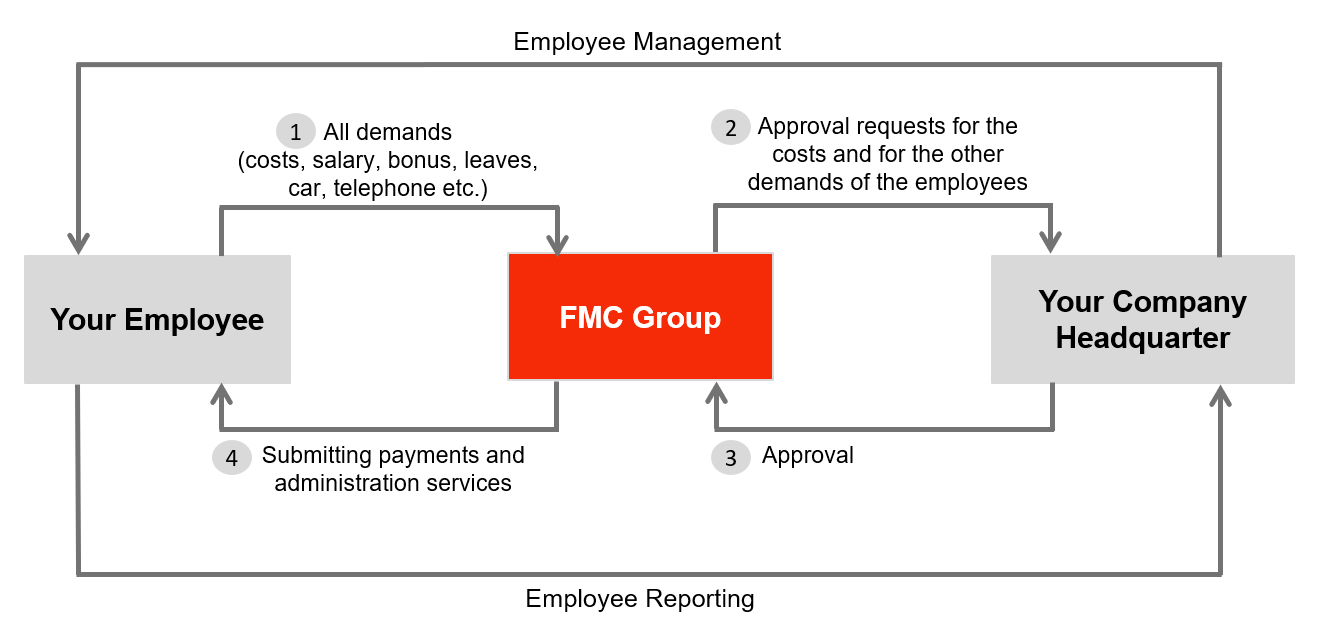
Employer of Record Poland
Our Employer of Record in Poland service enables clients to hire employees without the need to operate a local legal entity there.
It makes a big difference to develop a new market with your own personnel on the ground. Particularly for functions related to sales & marketing, business development, distributor management, and service & maintenance, our customers are very satisfied using our Poland Employer of Record Service.
Our customers and their local teams can be free of the distractions of administrative tasks and complex local requirements. So you can fully focus on the development of your core business.
If your local business grows large enough, you can easily transfer the employees to your own subsidiary. It also provides a quick exit strategy if necessary. In addition to Poland, we offer Employer of Record services in several other countries.
Content:
- Employer of Record Poland – FMC Group’s Approach
- Hiring an Employee
- Income Tax
- Typical Benefits
- Visa for the Employees
- Time off Policies
- Terminating an Employee

Get in touch with us

Employer of Record Poland - FMC Group's Approach
- Quick, flexible, and easy entry into Poland in compliance with local employment laws
- Complete control over business development with your own team
- Good option for building up, managing, and supporting your distributors and key accounts by directly observing local developments and adjusting the strategy whenever necessary
- Using our comprehensive recruitment experience for international clients, we can form a local team that fits your corporate culture.
- Focusing on your core business instead of dealing with the time-consuming and complex local administrative tasks
- Allowing for easy market exit if necessary
- Integrating your employees into our team through motivational events and special meetings
EOR Poland Management & Reporting Flow

Hiring an Employee
Employment Contract – indefinite vs. fixed term
- Fixed-term employment contracts may last a maximum duration of 33 months, with a probationary period not exceeding 3 months. The termination notice period ranges from 2 weeks to 3 months, and severance pay varies between 1 to 3 months. It’s important to note that time following probation is considered a distinct contract. An employer issues a “Letter of Extension” upon successful completion of the probationary period.
- Indefinite contracts mirror these terms, including a probationary period of up to 3 months, a termination notice period spanning from 2 weeks to 3 months, and severance pay ranging from 1 to 3 months. Similarly, the post-probation period constitutes a separate contract, with the issuance of a “Letter of Extension” upon probationary completion.
Probation Period
Work Week, Overtime & Maximum Working Hours
Employees work 40 hours spread over 5 days each week.
Overtime is permitted in emergencies or when special work demands arise, up to 150 hours per year.
Overtime compensation is calculated at 150% of the regular pay, rising to 200% on Sundays, holidays, or during night shifts.
Income Tax
Poland has a progressive income tax system for individuals
| Taxable Income (PLN) | Tax rate( %) 2024 |
| Up to PLN 85,528 | 17% |
| Over PLN 85,528 | 32% |
Typical Benefits
In Poland, typical employee benefits can vary depending on the industry, company size, and specific policies of the employer. However, here are some common benefits that many Polish companies offer to their employees:
- Health Insurance: Most companies provide health insurance coverage to their employees, which may include both basic medical services and sometimes additional benefits like dental care or vision coverage.
- Paid Time Off : This includes paid vacation days, public holidays, and sometimes additional leave for personal reasons or family emergencies..
- Retirement Benefits: Many companies offer some form of pension or retirement savings plan to help employees save for their future.
- Employee Assistance Programs: These programs offer counseling and support services to employees dealing with personal or work-related issues.
- Flexible Working Hours: Some companies provide flexibility in working hours or the option to work remotely, allowing employees to better balance work and personal life.
- Training and Development: Opportunities for training, skill development, and career advancement are often provided to help employees grow within their roles and contribute more effectively to the company.
Visa for the Employees
The requirements for obtaining a work permit in Poland.
- Processing Time: It takes approximately 2 weeks to process a work permit application.
- Work Permit Process: Work permits are issued by the relevant province governor based on the location of the employer’s registered office.
- Work Permit Validity: Permits are typically valid for up to 3 years, and 5 years for management board members.
- Work Permit Restrictions:
- Foreign nationals must receive remuneration equal to or higher than what a Polish employee in a similar position would receive.
- The district governor must confirm that the job cannot be filled by a registered unemployed person.
- Time Frame: It usually takes 1-2 months to obtain a work permit.
- Exceptions to Restrictions: Work permits serve as the basis for obtaining a work visa at the foreign national’s embassy. Additionally, foreign nationals staying in Poland for more than three months must obtain a temporary residence permit.
Time off Policies
Public Holidays
- New Year’s Day
- Epiphany
- Easter Sunday
- Easter Monday
- Labor Day/May Day
- Constitution Day
- Whit Sunday
- Corpus Christi
- Assumption Day
- All Saints’ Day
- Independence Day
- Christmas Day
- Second Day of Christmas
Annual Leave
Sick Leave
Employees in Poland are also entitled to additional certified paid sick leave for prolonged illnesses as prescribed by a physician. This type of leave necessitates an official statement from a doctor. In such instances, the employer covers up to 33 days of sickness (or up to 14 days for employees aged 50 or above), with any additional days being covered by ZUS (The Social Insurance Institution)
Other Leave Types
Terminating an Employee
Employment agreements can be terminated by mutual agreement between the employer and employee without any repercussions. While indefinite and fixed-term contracts are more challenging to end as they necessitate legal grounds and justification, employees have the right to contest these reasons in labor court if they disagree. Notice periods vary depending on the duration of employment.
During the probationary period, the required notice is as follows:
- 3 working days if the probationary period is less than 2 weeks.
- 1 week if the probationary period exceeds 2 weeks.
- 2 weeks if the probationary period lasts for 3 months.
For fixed-term and indefinite contracts, the required notice periods are:
- 2 weeks for employees with less than 6 months of service.
- 1 month for employees with at least 6 months of service.
- 3 months for employees with at least 3 years of service.
Disclaimer: Although we carefully researched and compiled the above information, we do not give any guarantee with respect to the actuality, correctness, and completeness.
